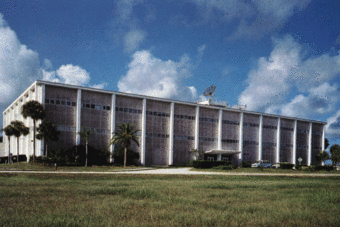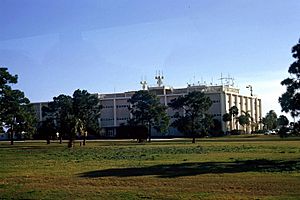Central Instrumentation Facility facts for kids
|
Central Instrumentation Facility
|
|
|
Formerly listed on the U.S. National Register of Historic Places
|
|
 |
|
| Location | Brevard County, Florida, USA |
|---|---|
| Nearest city | Titusville, Florida |
| Built | 1965 |
| Architect | Charles Luckman |
| Architectural style | International |
| Visitation | n/a |
| MPS | John F. Kennedy Space Center MPS |
| NRHP reference No. | 99001635 |
Quick facts for kids Significant dates |
|
| Added to NRHP | c. 1974 |
| Removed from NRHP | 21 January 2000 |
The Central Instrumentation Facility (CIF) was a special building at the Kennedy Space Center (KSC) in Florida. It was like the brain for handling important data and equipment during the Apollo program and the early days of the Space Shuttle program.
This building brought together many different tasks. It had offices, labs, and test stations. It also managed general equipment for more than one launch complex. The CIF even had a super-accurate clock. This clock made sure all countdowns and other timing devices at KSC were perfectly precise.
The CIF also held powerful computers and electronics. These were used to process telemetry data. Telemetry is like sending information from far away, like from a rocket in space. This data was then analyzed and sent to other NASA centers. The building was three stories tall and about 134,335 square feet. It was located just west of the KSC Headquarters Building. You could easily spot it because of all the different antennas on its roof!
Later, during the middle part of the Space Shuttle program, the CIF was not used as much. Other places, like the launch control center, took over most of its jobs. The building started to fall apart. In September 2017, all the equipment inside was given away. Some went to the visitor complex, and some went to storage. The empty building was then taken down in October 2017.
History of the CIF Building
The Central Instrumentation Facility was built because people wanted to keep all data handling in one place. Karl Sendler, who was KSC's first director of information systems, thought this was a great idea.
They learned some things from earlier rocket operations. But the new Launch Complex 39 was much farther away. So, they had to plan carefully. NASA worked with other centers and the Eastern Range to build the CIF.
They made sure all the metal in the building was connected to the ground. This helped prevent electrical problems. The regular power and the special equipment power were grounded separately. Even fluorescent lights were not allowed. This was because they could cause electronic interference. The famous architect Charles Luckman designed the CIF. He also designed other buildings nearby.
CIF Antenna Site
There was also a smaller building linked to the CIF. It was called the CIF antenna site. This building was placed about 1.5 miles (2.5 km) north of the main industrial area. It was put there to avoid radio interference. This spot also gave it a clear view of the NASA launch complexes.
![]() This article incorporates public domain material from websites or documents of the National Aeronautics and Space Administration.
This article incorporates public domain material from websites or documents of the National Aeronautics and Space Administration.




